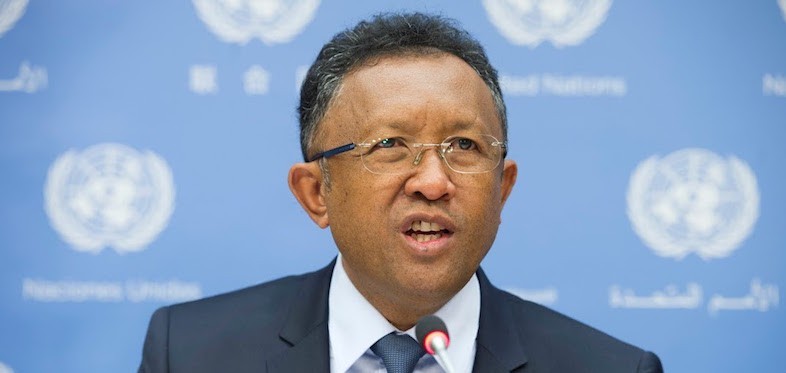Madagascar’s Rocky Path to Democracy
After five years of political turmoil and economic standstill, Madagascar seems to be headed for recovery. The new democratic government wants to restore rule of law, tackle poverty, and foster growth. Yet the island remains burdened by a legacy of power struggles and corruption.
The men open the heavy steel door of the container. This one is full of ebony. They unload log after log of the dark dense wood. The growing pile of precious timber shines deep black in the midday sun.
Are we at a mill? No, these are the gardens of Madagascar’s presidential palace, just a short drive from the capital Antananarivo. It is February 2014 and Madagascar’s new president, Hery Rajaonarimampianina, has decided to take stock of what his predecessor, Andry Rajoelina, left behind on the palace grounds. Tons of rosewood end up on the inventory list—the tree is threatened and thus illegal to cut, process, and sell in Madagascar. As more and more logs pile up on the grass, I wonder whether President Rajaonarimampianina will manage to break through the obstacles that block Madagascar’s path to prosperity and security.
When my colleague Aline Ranaivoson and I interviewed the president for the Secrets of Transformation series, a joint project of Deutsche Welle and the Bertelsmann Stiftung that examines winners and losers in the Bertelsmann Transformation Index (BTI), he told us that fighting corruption and crime related to the lucrative rosewood smuggling business are among his top priorities. Yet when we asked him how he wanted to achieve those goals, Rajaonarimampianina’s strategy remained rather vague. Even with more military vessels patrolling the island’s extensive coastline it is difficult to imagine how the under-equipped authorities will control the entire island. Many people benefit from the smuggling and some have no alternative if they want to survive.
Rajaonarimampianina also talked about reducing poverty. About half of the 22 million inhabitants of Madagascar live on less than a dollar a day. Already among the world’s poorest countries despite its natural riches, Madagascar plummeted further in 2009 after Rajoelina seized power from then-President Ravalomanana in a coup. Foreign investors turned their backs on the island, and Western governments cut aid.
Moreover, fighting between the followers of Rajoelina and Ravalomanana brought the country to a standstill. 130 people died. Tourists stayed away from the Indian Ocean paradise. The African Union suspended Madagascar’s membership. Eventually Rajoelina acceded to international pressure to hold elections without putting his name in the hat. Instead, he backed the presidential candidacy of his finance minister, Hery Rajaonarimampianina. Ravalomanana fled to South Africa and hasn’t returned yet. The deadly fight for political dominance lasted five years.
“That time is now over,” President Rajaonarimampianina told us in February. “We are again showing respect for the constitution.”
In April, he appointed Kolo Roger, who is backed by a majority in parliament, as prime minister. The political elite of the country can now stop fighting over power and start working on issues again. Yet years of lawlessness have left the whole island deeply scarred. Most people I spoke to were skeptical of the government and its institutions. A homeless woman in the capital’s Andavamamba slum said she didn’t even consider herself a citizen, since she was not registered. “We subsist on garbage, we don’t have any rights,” she said. On a cassava field several kilometers east of Antananarivo, a young farmer told us that security was her main concern. Nobody is afraid of the police, that is why people steal her crop, she said.
There is reason to hope that even the poorest will eventually benefit should Madagascar return to full democracy. On May 27, the U.S. Department of State lifted all remaining restrictions on direct assistance to Madagascar. Private investors and tourists might follow suit and add further impetus to Madagascar’s economy.
Yet Madagascar’s democratically elected government will have to reestablish the rule of law if it wants to succeed in winning people’s trust and rebuilding the country. As the BTI Madagascar Report emphasizes, successful elections alone should not be expected to “resolve the profound weakness of institutions and, particularly, the deeply eroded capacity of the state to govern, enforce and regulate through critical sectors.”
Fostering the rule of law in Madagascar will be especially hard since the island is vast and roads are rare. Remote areas such as Masoloa National Park in the northeast of the island can hardly be controlled. This is one of the places where rosewood is illegally chopped, loaded on small boats, and then shipped to larger vessels mostly bound for Asia.
And despite repeated declarations by Madagascar’s new government that it will get a grip on illegal logging, reports of smuggling continue. On May 26, authorities in the Kenyan port of Mombasa opened containers destined for China and found precious wood worth $6.8 billion.
Peter Hille works as duty editor for the news department of Deutsche Welle, Germany’s international broadcaster. He recently worked on the multimedia Secrets of Transformation series, a joint project of Deutsche Welle and the Bertelsmann Stiftung, which examines the winners and losers of transformation.
Related BTI
Study: BTI 2014 Report
Political Management in International Comparison
